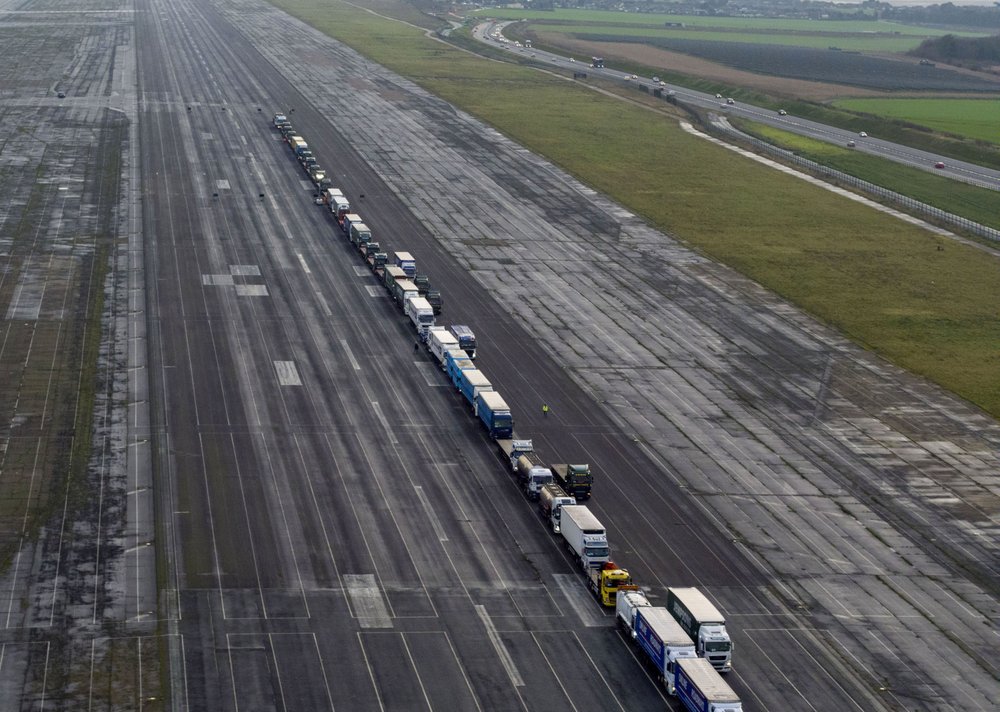
Some 150 trucks are parked at Manston Airfield during a test for a 'no-deal' Brexit, where 6,000 trucks could be parked at the airfield near Ramsgate in south east England, Monday, Jan. 7, 2019. The former airfield at Manston could be used as part of the government plan to park some 6,000 trucks to alleviate expected congestion at the channel ports, about 25 miles (40 Km) from the airfiled, caused by the reintroduction of customs checks on goods in the event of Britain making a no-deal withdrawal from the European Union at the end of March. (Photo: AP)
Britain is testing how its motorway and ferry system would handle a “no-deal” Brexit by sending a stream of trucks from a closed local airport to the port of Dover — even as some legislators try to pressure the government to rule out the scenario.
The tests began Monday morning and are intended to gauge how severe the disruption would be if Britain leaves the European Union on March 29 without an agreed-upon withdrawal deal.
It is widely expected that an abrupt departure would lead to the introduction of tariff and customs barriers that would slow fast-moving ferry and rail traffic that links Britain to continental Europe. There are concerns that major traffic jams leading in and out of ferry ports like Dover would greatly hamper trade and leave Britain without adequate food and medicine.
Parliament is expected to resume its debate over the government’s planned withdrawal deal Wednesday, with a vote widely expected a week later.
There are no indications that lobbying over the Christmas and New Year holiday period has garnered Prime Minister Theresa May more support for her plan.
The withdrawal agreement, which is required before more wide-ranging discussions on future relations can commence, foresees relatively close economic ties with Europe, particularly in the immediate aftermath of Brexit, in order to avoid the imposition of a hard border between EU member Ireland and Northern Ireland, which is part of the U.K.
As well as frustrating a number of lawmakers who want a complete break from the EU, the plan also raises the prospect that the U.K. could be “trapped” in a customs arrangement if no agreement on future trade ties is reached. There are also a number of lawmakers who have said they will vote against the deal because they want another referendum on Britain’s membership of the EU.
A vote that had been scheduled in December was delayed as May admitted it would face certain defeat.
May said Monday she is still trying to get more from EU leaders, who insist they are not willing to sweeten the deal. She told hospital workers in Liverpool there has been “some further movement” from the EU but did not provide specifics.
“We are continuing to work on further assurances on further undertakings from the European Union in relation to the concern that has been expressed by parliamentarians,” she said.
She was castigated in Parliament by Labour Party leader Jeremy Corbyn, who said the prime minister is wasting precious time by pushing a deal that has no support.
The prospect of the bill’s possible defeat next week has renewed concern about a “no-deal” scenario. Fears about economic disruption Monday prompted roughly 200 legislators including some from the prime minister’s Conservative Party to write to May asking her to rule out the no-deal scenario.
May has not spelled out how she will respond if the withdrawal bill is voted down next week.
Brexit minister Kwasi Kwarteng said Monday that the government is still focused on winning the vote.
“A week is a very long time in politics. We don’t know what the numbers are,” he told BBC. “We have got a week. I think the situation — as it always does — has developed, it evolves. I am very hopeful that the deal will be voted through next week.”


